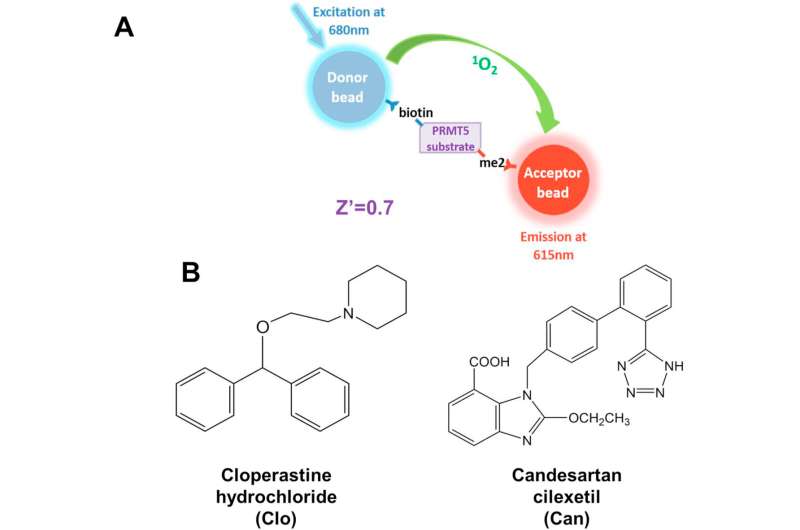This article has been reviewed according to Science X's editorial process and policies. Editors have highlighted the following attributes while ensuring the content's credibility:
fact-checked
proofread
Inhibition of prmt5 by repurposing market drugs: A fresh therapeutic pathway for cancer treatment

In a recent study published in the journal of Genes & Diseases, Research team led by Lu explores the potential for the use of FDA-approved hypertension and EMA-approved cough medicines to revolutionize cancer treatment.
Cancer continues to be a pressing global health challenge, with pancreatic ductal adenocarcinoma (PDAC), colorectal cancer (CRC), and breast cancer (BC) ranking among the most prevalent and deadly. As the need for more effective, safe, and economical cancer treatment options intensifies, a team of scientists has discovered a promising breakthrough in the form of existing U.S. Food and Drug Administration (FDA) and European Medicines Agency (EMA)-approved drugs.
Protein arginine methyltransferase 5 (PRMT5) overexpression has been linked to promoting the tumor phenotype in several cancers. Using an innovative AlphaLISA-based high-throughput screening method, the research team identified Candesartan cilexetil (Can), an FDA-approved hypertension drug, and Cloperastine hydrochloride (Clo), an EMA-approved cough suppressant, as possessing notable PRMT5-inhibitory activity.
Remarkably, the researchers validated the anti-tumor properties of these drugs using cancer phenotypic assays in vitro, confirming the reduction of both NF-κB methylation and its subsequent activation upon drug treatment.
These findings provide compelling grounds for considering Can and Clo as anti-PRMT5 cancer therapies. The potential safe and rapid repurposing of these previously unknown PRMT5 inhibitors into clinical practice could save significant resources, streamline processes, and ultimately expedite the delivery of much-needed treatments to cancer patients.
The concept of drug repurposing, particularly for drugs approved by the FDA or EMA, is not new. It has been widely adopted in drug discovery and development, delivering several success stories, such as Sildenafil (Viagra), initially developed for hypertension and later repurposed to treat erectile dysfunction.
The appeal lies in the established safety, efficacy, formulation, and toxicity profiles of such drugs. Repurposed drugs can reach approval up to 3-12 years faster and at approximately 50% lower cost compared to novel drugs. The current research targets PDAC, CRC, and BC, responsible for a significant number of cancer-related deaths.
Despite available chemotherapy and targeted therapies, mortality rates continue to rise, and the costs associated with developing new treatments and patient care are astronomically high. This necessitates fast-paced, cost-effective solutions such as the repurposing of FDA-approved drugs.
Detailed in the study, Can and Clo were found to significantly reduce cancer cell proliferation and tumor growth. The researchers employed in silico prediction methods to identify critical residues on PRMT5 targeted by these drugs, potentially interfering with its enzymatic activity. Consequently, these drugs exhibited marked reduction in tumor growth in vivo.
Moving forward, the team is optimistic about exploiting PRMT5 as a therapeutic target for these cancers. This breakthrough in the cancer treatment landscape paves the way for future research and applications, particularly in accelerating the repurposing of FDA-approved drugs and, in turn, the clinical treatment of some of the deadliest cancers.
The study reinforces the critical role of drug repurposing in streamlining the lengthy and costly drug development process. It further underscores the potential of repurposed drugs in uncovering novel treatment targets, potentially transforming the cancer treatment landscape and providing an effective, safe, and economical solution for cancer patients.
Despite these promising findings, further research is required to explore the full potential of these market drugs as cancer therapies. The team remains dedicated to the pursuit of innovative solutions in the battle against cancer and hopeful for the future of cancer treatment.
The research is published in the journal Genes & Diseases.
More information: Lakshmi Prabhu et al, Inhibition of PRMT5 by market drugs as a novel cancer therapeutic avenue, Genes & Diseases (2022). DOI: 10.1016/j.gendis.2022.04.001


















